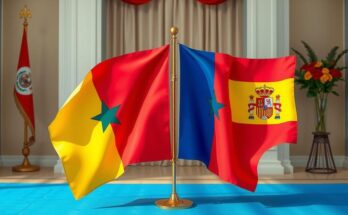Uruguay stands out for its political stability amid global polarization, with effective leadership transitions and civic engagement. Under President Orsi, there is potential for both addressing economic challenges and enhancing democratic practices. Encouraging collaboration among political rivals and maintaining trust in institutions play crucial roles in this ongoing narrative. The country’s resilience against discontent reflects a dedication to civility and democratic integrity.
Uruguay continues to distinguish itself as a model of political stability amid growing global polarization. With Yamandú Orsi from the center-left Frente Amplio coalition assuming the presidency on March 1, 2024, the country demonstrates a commitment to democratic principles, highlighted by a seamless transition of power and consensus-driven approaches. The nation’s political landscape promotes civility among rivals, diminishing adversarial tensions and fostering a collaborative spirit regardless of differences.
Characterized by one of Latin America’s highest GDPs per capita, Uruguay’s relative prosperity offers a backdrop that curbs extreme political sentiment. The absence of hostile rivalries increases civic engagement, as citizens participate actively in discourse and community affairs. As a testament to its democratic integrity, Uruguay ranks favorably against established democracies such as France and the United States in various political indices, celebrating a strong system of representation and accountability.
Uruguay’s political culture, shaped post-dictatorship since 1985, emphasizes mutual respect among party leaders, which permeates through the electorate. The population’s engagement with civic institutions, such as political parties and unions, contributes to high levels of institutional trust. Significantly, this dedication to democratic norms helps prevent fragmentation, allowing the population to engage in dialogue rather than divisive rhetoric.
Despite these positive attributes, Uruguay faces critical long-term challenges, including economic stagnation and high youth unemployment rates. While it enjoys lower levels of corruption than many countries, rising dissatisfaction can translate into disillusionment with traditional politics. Moreover, the education system’s underperformance and increasing insecurity necessitate proactive policy responses, particularly from new leadership to avoid complacency and foster innovation.
President Orsi’s tenure presents a momentous opportunity for addressing these issues. The balance between maintaining harmony and engaging in necessary reforms will be paramount. Uruguay’s international relations also invite scrutiny, particularly regarding diplomatic invitations that reflect ideological positions. As it stands, the country must navigate both internal and external political landscapes judiciously to uphold its democratic accomplishments and respond to present-day pressures.
In summary, Uruguay’s framework offers valuable insights for other democracies grappling with polarization. Effective leadership, economic stability, and trust in institutions emerge as crucial elements for achieving lasting political harmony. By remaining vigilant, Uruguay can continue fostering equity and civic involvement, ensuring that it rises to meet the demands of a politically charged global environment.
In conclusion, Uruguay exemplifies a resilient democracy amidst global challenges by fostering political civility and robust civic engagement. While the country enjoys economic strengths and low inequality, it must address emerging societal issues and engage in necessary reforms. Leadership under President Orsi will be critical in navigating these dynamics, leveraging Uruguay’s democratic foundations while adapting to contemporary challenges. Ultimately, the nation serves as a noteworthy model for maintaining political stability and promoting active citizenship.
Original Source: foreignpolicy.com




